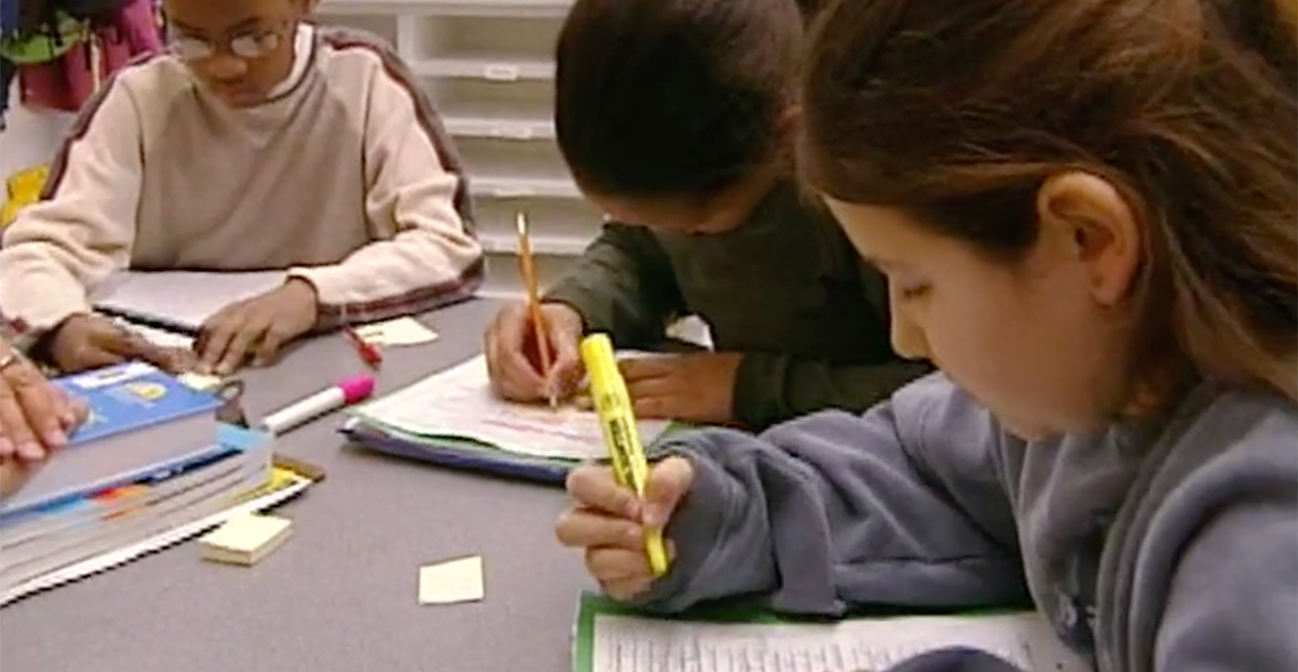Join us for conversations that inspire, recognize, and encourage innovation and best practices in the education profession.
Available on Apple Podcasts, Spotify, Google Podcasts, and more.

How can classroom organization and daily routines help students become better readers and writers? In this session, literacy expert Jeanne Paratore outlines strategies teachers can use to enhance literacy skills. You will learn how classroom organization, everyday routines, and grouping practices affect literacy skills in the middle grades. You will explore research-based strategies that help students learn, and see examples from actual classrooms.
“One of the things good teachers do is create a classroom context that in some ways mimics a real world context. If a child learns how to use reading and writing to get things done in the classroom, then the child also knows how to use reading and writing to get things done outside of the classroom. “
Jeanne R. Paratore
Associate Professor
Boston University School of Education
 Jeanne Paratore is associate professor of education at Boston University. She was formerly a classroom teacher, reading consultant, and director of Title I. From 1989-1997, Professor Paratore was an integral member of the Boston University/Chelsea, Massachusetts School Partnership, a comprehensive urban school reform effort. As part of this work, Professor Paratore founded and now serves as advisor to the Intergenerational Literacy Project, a family literacy program that serves immigrant parents and their children. Her work on school change and family literacy is described in numerous monographs, book chapters, and journal articles. She has also authored and edited several books. Professor Paratore is a frequent speaker on literacy instruction and has presented at local, national, and international reading and educational research conferences, as well as in school districts throughout the United States. She recently completed a three-year term as a member of the International Reading Association’s Board of Directors.
Jeanne Paratore is associate professor of education at Boston University. She was formerly a classroom teacher, reading consultant, and director of Title I. From 1989-1997, Professor Paratore was an integral member of the Boston University/Chelsea, Massachusetts School Partnership, a comprehensive urban school reform effort. As part of this work, Professor Paratore founded and now serves as advisor to the Intergenerational Literacy Project, a family literacy program that serves immigrant parents and their children. Her work on school change and family literacy is described in numerous monographs, book chapters, and journal articles. She has also authored and edited several books. Professor Paratore is a frequent speaker on literacy instruction and has presented at local, national, and international reading and educational research conferences, as well as in school districts throughout the United States. She recently completed a three-year term as a member of the International Reading Association’s Board of Directors.
Cunningham, P. M., and R. L. Allington. Classrooms That Work. New York: Addison Wesley Longman, 1999.
Diller, D. Literacy Work Stations: Making Centers Work. Portland, ME: Stenhouse, 2003.
Flood, J., and D. Lapp. “Teaching Writing in Urban Schools: Cognitive Processes, Curriculum Resources, and the Missing Links–Management and Grouping.” In Perspectives on Writing: Research, Theory, and Practice, edited by R. Indrisano and J. Squire, 233-250. Newark, DE: International Reading Association, 2000.
Fountas, I., and G. S. Pinnell. Guiding Readers and Writers, Grades 3-6. Portsmouth, NH: Heinemann, 2001.
Johnston, P., T. Bennett, and J. Cronin. “I Want Students Who Are Thinkers.” In Reading to Learn, edited by R. Allington and P. Johnston, 240-265. New York: Guilford Press, 2002.
Morrow, L. M. The Literacy Center: Contexts for Reading and Writing. Portland, ME: Stenhouse, 2002.
Opitz, M. F., and M. P. Ford. “What Do I Do with the Rest of the Kids? Ideas for Meaningful Independent Activities During Small-Group Reading Instruction.” The Reading Teacher 58, no. 4 (Dec. 2004/Jan. 2005): 702-714.
![]()
Council for Exceptional Children Student Groupings for Reading Instruction
This site features an article for teachers on effective grouping practices for all students to develop literacy learning.
Learn North Carolina: Creating Classroom Environments
This site, from the University of North Carolina at Chapel Hill, provides information for teachers on creating an effective classroom environment for student learning.
Learn North Carolina: Creating Wall Displays
This site, from the University of North Carolina at Chapel Hill, provides information for teachers on developing meaningful wall displays.
New Horizons for Learning
This site provides teaching strategies and information on effective classroom routines to meet the needs of all students.
Read, Write, Think
This site, sponsored by the International Reading Association (IRA) and the National Council of Teachers of English (NCTE), includes information and lesson plans for research-based literacy instruction for all students.
If you are taking this workshop for credit or professional development, submit the following assignments for Session 1: Creating Contexts for Learning.
![]()
In this assignment, you will read two articles on classroom organization and grouping practices, and then complete the Examine the Literature Response Chart.
![]()
In this activity, you will develop a lesson using a range of books based on the curriculum, skills, interests, and cultural backgrounds represented in your classroom.
![]()
In this activity, you will develop classroom charts, grouping students together in reading based on their strengths, needs, interests, and work habits.
![]()
In this activity, you will write a summary of the ideas and strategies you explored in this session.
If you are taking this workshop for credit, the final project begins here. As you complete each session, you will be putting together a portfolio of ideas and strategies to enhance your practice.